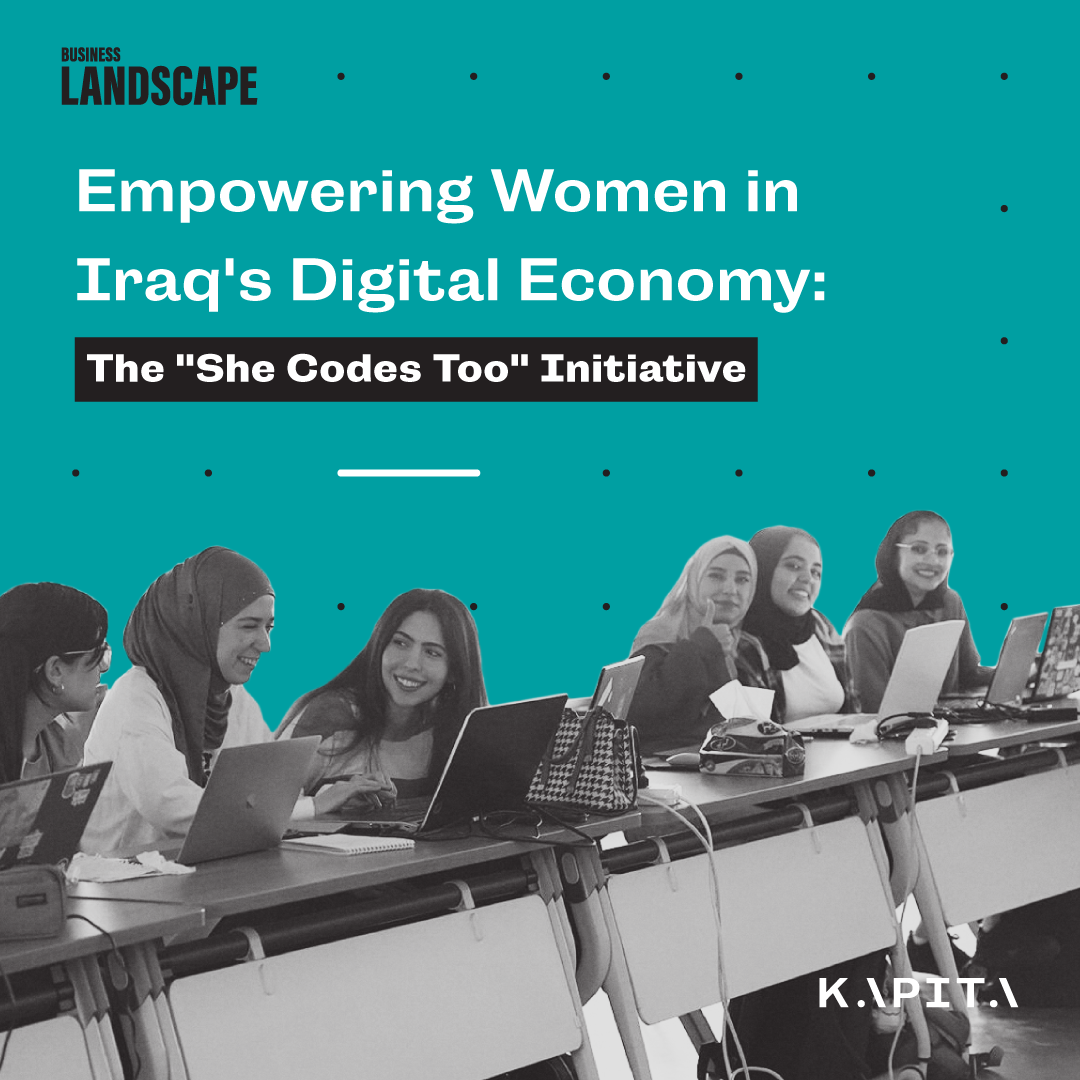Hayder Al Sammarray, Senior Investment Associate
َQudama Jalal, Investment Analyst
KAPITA Business Hub
Before the establishment of the Iraqi Angel Investors Network (IAIN), the Iraqi Startups ecosystem was in dire need of investment funds. The main enablers for the Iraqi ecosystem were the NGOs and international development programs, which focused on grant-based funds with capacity building on the basics of business development for startups and entrepreneurs. KAPITA identified this critical gap and decided to establish IAIN at the end of 2020, which paved the way for Iraqi entrepreneurs to access investment funds.
KAPITA has identified an urgent need to establish an investment entity to gather local, regional, and international investors interested in the Iraqi market and equip the local startups with the required skills to be investment ready. In addition, the Iraqi entrepreneurial scene has a wide gap between pre-seed, seed, and other investment rounds, as there is an absence of facilitators to support startups in those stages. Thus, the Iraqi Angel Investors Network (IAIN) was born in September 2020 as the 1st Angel Investors Network in Iraq. It came about to serve as the bridge between the Iraqi entrepreneurs and investors, the startups and the investment funds.
IAIN managed to surpass one million USD worth of investments in less than two years despite the challenges of the emerging ecosystem. This was achieved by structuring the world-class investor network rules, procedures and conditions, and building a pipeline of startups that showed growth potential and could satisfy the investors’ appetite. IAIN provided these startups with professional investment readiness support plus legal advice throughout the investment process. This was only possible due to the support of our biggest enabler, the GIZ, and the technical support of the World Bank Group.
Since the establishment of the network, there have been eleven pitch days, more than 24 startups pitched their ideas, and the seven most promising startups were able to attract the investors’ attention and obtain a substantial investment. In addition, IAIN facilitated the process and linked the investors and startups, playing a significant role in the discussions after the pitch. The network was also often involved in the negotiations between both parties upon their requests and their technical and legal support needs. This was executed to establish a stable investment environment for our angel investors, startups, and the Iraqi business ecosystem.
KAPITA played an essential role in encouraging angel investors to invest in Iraqi startups by co-investing in some startups to reduce the risk factor for investors and to increase their trust in the Iraqi startups and founders. In addition, GIZ matched the investment with a grant in its unwavering efforts to support the Iraqi entrepreneurial scene. These favorable circumstances, coupled with startups reaching their investment milestones, made them more trustworthy for future investment resulting in additional investment rounds that led to their growth and success.
The Challenges
During the journey to achieve this investment milestone, we faced many challenges that we had to overcome, especially the state of the emerging startup scene.
The Covid-19 Pandemic:
IAIN was established in the 4th quarter of 2020, at that time, the impact of Covid-19 was grave on the business and specifically on startups. It has also had ramifications on investors' decisions and behavior. Many investors shifted their interests to e-businesses and online platforms due to their adaptability and the rising rate of their revenue during the Covid-19 pandemic.
The Adverse Business Environment:
The process of establishing a business in Iraq is costly and often complicated. The registration of businesses has become a necessity that is difficult to achieve for all startups due to the number of obligations that are inconsiderate of modern types of companies and business models, especially those operating in the technology domain. Thus, the registrar treats startups similarly to larger and more established enterprises. If an entrepreneur’s business is not legally registered, then they would not be able to have a valid agreement with an investor because the startup's financial obligation, profit or loss, is expected to be the startup’s and not the founder’s.
Limited Scalability of Startups:
Despite the number of applications or the scouting of businesses that have what it takes to join the network, the main ongoing challenge is finding a business that has a scalable vision and has been operating for a considerable period of time that can attract investors’ interest. Often entrepreneurs dive head-first into their ideas without considering proper planning for how to operate and scale their businesses, which is the equivalent of planning to fail.
Financial Illiteracy:
Most startups have very small teams with few members doing various tasks, neglecting the essential role of accounting and bookkeeping. In addition, many founders are under the false assumption that they know their business enough and do not need to hire a professional accountant or perform proper bookkeeping.
As a result, those startups lack accurate documentation and financial data to present to investors, consequently missing the opportunities to obtain investment.
The Inadequate Digital Transformation:
The shift from physical stores and traditional business models, such as retail, to tech-enabled businesses, is challenging for many reasons, including internet penetration, mobile phone penetration, and tech awareness among customers. Moreover, digital payment integration is slowing the transition to tech-enabled businesses. Most startups are trying to provide digital payment options. Still, the distrust of citizens in digital payment and the dominance of cash-based culture has created a customer behavior that prefers cash on delivery (COD). This created a new issue, particularly for fully automated businesses that lack capital.
Investors’ Preference:
Investors’ appetite sways toward tech-enabled businesses. They are also focused on post-revenue stage startups, which limits the pool of startups, especially considering the current growth stage of the Iraqi ecosystem and entrepreneurial scene. Furthermore, investors usually invest in entrepreneurs rather than businesses alone. They carefully inspect founders as they consider them potential partners, which means that the founders should check multiple boxes, including reliability, dedication, work ethics, passion, and determination, amongst many other factors.
Key Takeaways from the Negotiation Table:
The early deals of the Network were struck with startups that addressed a real market or industry challenge and provided a feasible solution to that challenge, regardless of whether those startups had similar business ideas or business models to others in the market.
Providing the appropriate operating model and resolving the flaws in the rivals' operation model provides a competitive edge that, in the long run, will attract the interest of investors and lead to a successful fundraising round.
In the early phases of a startup, receiving funds is less significant in terms of the validation and success of a business. However, it serves as proof that the business is on the right track or has a competitive edge.
Valuation based on the startups' wishes, wants, and sometimes needs is often a deal breaker for investors. Investors are looking for startups that can use the funding in accordance with a proper business strategy and plan in order to advance and scale up their business for future investment rounds and a higher valuation, instead of those who are looking to have a high burn rate without a sound business plan.
Failing to receive funds or interest from investors does not necessarily mean that the business is not on the right track. Startups often have to pitch to many investors and entities multiple times to raise funds. Sometimes the issue arises because startups do not pitch to investors in their relevant field.
Recommendations
For IAIN Investors:
Investors should always try to explain to startups why they would not invest in their business, whether it is irrelevant to investors’ field of interest, or an issue in the stage of the company's development, operations, business idea, and/or management strategy. This helps entrepreneurs work on their shortcomings for their future pitch days.
Furthermore, it is preferable that interested investors contact the startups after the pitch day to discuss their interest in the business. Investors may also set milestones and key performance indicators (KPIs) for the business. If those KPIs are met within a certain time frame, they may begin negotiations for the business fundraising round.
For Non-IAIN Investors:
For investors interested in the Iraqi market, IAIN will provide you with the opportunity to learn more about the Iraqi Startups ecosystem. It will facilitate your investment in Iraq, give you a front-row seat on pitch days, discuss with entrepreneurs about their businesses, and have insights from the IAIN team. The Iraqi market is promising with untapped potential.
For Entrepreneurs:
There needs to be more than a unique business idea and profitable business model to attract investors. Entrepreneurs need to be more aware that investors are looking for their future partners and want to see the potential in them to invest.
It is essential to employ a sound accounting system or hire a professional accountant from the very early days of the business. Proper bookkeeping is essential to show financial data and traction.
Before the pitch day, entrepreneurs should research to know who the investors are, their interest domain, and their investment portfolio. Entrepreneurs must have an idea about those finer details, which could be an asset for them to understand what to target to attract the right investors.
Build your pitch deck in a proper and clear structure and come prepared for the pitch to reflect your confidence as a founder and the competence of your business.






